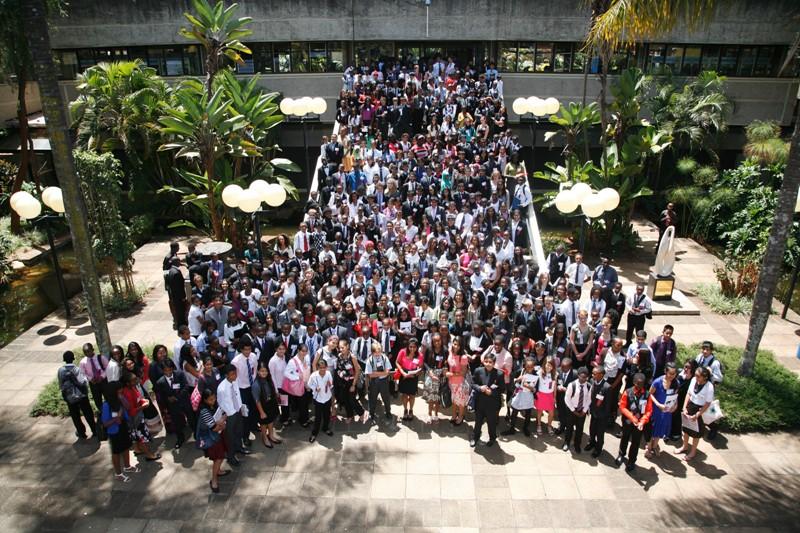- عربي
- 中文
- English
- Français
- Русский
- Español
Middle School Model UN Conference 2013
- Ladies and Gentlemen
- Young Delegates.
I would like to welcome all of you to the United Nations Office at Nairobi to attend this Model United Nations Conference.
I would also like to applaud you, the participating students, for all the hard work you have put into preparing for the conference.
You join the more than 400,000 middle school, high school, college and university students worldwide who participate in Model UNs every year.
We at the United Nations have long recognized that the imagination, ideals and dynamism of young people are vital for the continuing development of their own societies, and of the global community.
One year ago, Secretary-General Ban Ki-moon identified “Working with and for Women and Young People” as one of his top priorities for his second term in office.
Towards this end, just six days ago, the Secretary-General announced the appointment of his Envoy on Youth, Mr. Ahmad Alhindawi of Jordan. The new Envoy, who is 28 years old, will help address the needs of the largest generation of youth the world has ever known.
Speaking last year to the Commission on Population and Development, Secretary-General Ban Ki-moon noted that “the world’s young people have their eyes wide open. They are informed as never before. They are connected to one another. And they care.” He also said that “this generation of youth is shaping history” and that youth “are a force for progress”.
Those sentiments could never be truer and more relevant than they are in Kenya today. As you know, Kenya is preparing to hold very important general elections in March - the first since the post-election violence in 2007-8 and since the adoption of the country’s new Constitution in 2010. Since the 2007 elections, much work has been done by the Kenyan Government and the Kenyan people, with the support of the United Nations and other international partners, to help ensure that there is no repeat of electoral violence this time around.
We are all hopeful that the upcoming Kenyan elections will be free, fair and peaceful. All of you, particularly the Kenyan delegates, can help make that happen. As young citizens, you can help raise awareness of the need for all concerned to do their utmost to ensure that the elections will be credible, orderly and violence-free. This is a time when Kenya, and the entire region, needs people like you - young promoters of dialogue and peaceful co-existence.
During your stay here, and also once you leave, I urge you be true advocates of tolerance, champions of non-violence, Ambassadors of peace – in your homes, your schools, your communities. In that way, you will be making important contributions, not only to promoting the values of the United Nations, but also to building lasting peace and sustainable development in Kenya and the sub-region.
Dear Delegates,
During your time here, you are meeting, preparing policy papers, debating issues, drafting and voting on resolutions. You are experiencing first-hand the challenges of working with colleagues representing different parts of the world. In doing so, you are gaining an awareness of the purpose and the functions of the UN in today's complex world.
It is often said that if we did not have the United Nations, it would have to be invented.
As a family of organizations, the United Nations performs a vast range of duties that affect us all in a number of ways:
- The UN is often amongst the first to act on major global issues, such as the environment and illicit drugs, and provides the best mechanism available to mobilize and sustain international cooperation to tackle these issues.
- The UN and its agencies help build economies and stabilize financial markets.
- They help eradicate disease, expand food production, and respond quickly to natural disasters.
- The UN and its agencies protect vulnerable groups, like children, refugees, displaced persons, minorities, indigenous people and the disabled.
- They provide the machinery for setting technical and legal standards in vital areas of global interaction, from air safety standards to human rights.
- The UN provides a neutral place for Governments to resolve their differences; and the UN helps resolve disputes between Governments, or between parties within a country.
- At the request of the Security Council, the UN deploys peacekeeping missions to help implement peace agreements.
Ultimately, the work of the United Nations is about creating a healthier, more stable world with enhanced opportunities and justice for all.
During this conference, I encourage you to be creative, and to strive for new and innovative approaches to the challenges of preventing conflict, building peace, alleviating poverty, protecting the environment and promoting respect for human rights around the world.
As the future leaders and decision makers of your countries, you are important agents of change. I hope this exercise will inspire you to learn more about and to tackle the issues and challenges facing our world.
I commend all of you for participating in this important meeting, and I look forward to hearing about the outcome of your deliberations.
Thank you.


